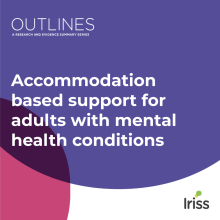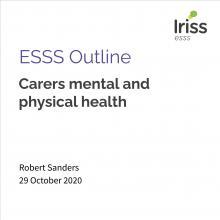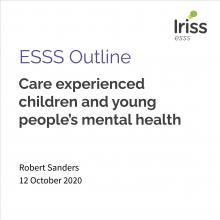Key points
- Despite high unemployment rates, most people with severe mental health problems want to work
- Employment or voluntary work is generally better for mental health than unemployment
- There is little relationship between employment outcomes and an individual's diagnosis
- Self-efficacy and motivation are the best predictors of work outcomes
- The Individual Placement and Support (IPS) model is one of the most robust interventions available for people with severe mental health problems who wish to gain and sustain employment
- IPS is no more expensive to implement than traditional methods of rehabilitation and the costs of supporting an individual decrease over time the longer the person remains in employment
Current situation and policy context
People with mental health problems are less likely to be employed than any other group of disabled people. In Scotland, there are an estimated 90,000 people who are economically inactive as a result of a mental health problem (Scottish Development Centre for Mental Health, 2008). Despite these high figures, evidence consistently suggests that most people with mental health problems want to work and that they are able to do so when provided with the appropriate support (Rinaldi et al, 2008).
There are compelling reasons for helping people with mental health problems gain employment. For a start, employment is known to be an integral part of recovery from mental ill health. Evidence also indicates that employment can lead to improvements in overall health and to reductions in both poverty and social exclusion (Sainsbury Centre, 2009a). There are also broader economic gains to be had in terms of increased productivity and reduced sick leave, a fact of key importance in Scotland where mental health problems are estimated to cost £8 billion annually (Audit Scotland, 2009).
In 2000, the World Health Organization recommended that employment be used as a way of integrating people with mental health problems into the community and improving their overall health. Since then, mental health policies in Scotland have focused increasingly on the provision of services for recovery rather than treatment. Within this context, employment has been recognized as aiding recovery, rather than being a consequence of it. The linkages between mental health and employment have been set out by the Scottish Government in Healthy Working Lives (2005), Workforce Plus (2006), Equally Well (2008) and most recently under Priority 4 of the Policy and Action Plan 2010-2011, Towards a Mentally Flourishing Scotland.
Barriers to employment
Knowing how best to support those with mental health problems into gainful employment requires an understanding of the barriers to employment. Numerous studies have pointed to low motivation, fear of losing welfare benefits and perceived stigma and discrimination as among the key factors inhibiting people from entering the workforce. In addition, Rinaldi et al (2008) reveal that the low expectations of health professionals have typically driven individuals into a cycle of decreasing hope and opportunity which, in turn, has had a negative impact on their ability to enter gainful employment. A survey conducted in one London borough in 2000 found that 44% of people with mental health problems in paid employment had been advised by their health professionals not to work (Rinaldi et al, 2008)
Research evidence
One of the most significant discoveries in research on vocational rehabilitation has been that there is little relationship between employment outcomes and an individual's diagnosis or social skills (Bond et al, 2008). Motivation and self-efficacy are seen to be the best predictors of work outcomes (Rinaldi et al, 2008). Such findings help to illuminate the drawbacks of traditional approaches to vocational rehabilitation and to enhance the credibility of supported employment models.
Models and approaches
Vocational training and supported employment are different ways of helping people with mental illness return to work. Vocational training assumes that people with severe mental health problems require a period of preparation before entering into competitive employment (Crowther et al, 2001). Examples of vocational training include sheltered workshops, transitional employment, skills training and other preparatory activities. Although well intentioned, such approaches have been shown to perpetuate low expectations and to be largely ineffective in assisting people enter open employment (Rinaldi et al, 2008).
Supported employment, in contrast, provides rapid placement in paid employment and time-unlimited support for both employees and employers (Sainsbury Centre, 2009a). The philosophy behind supported employment is that anyone is capable of working competitively if the right kind of job and work environment can be found and the right kind of support provided. The primary goal in this approach is therefore 'not to change the individual, but to find a natural match between the individual's strengths and experiences and a job in the community' (Rinaldi et al, 2008 p52).
Supported employment has been most extensively developed in the United States and found to be twice as effective as vocational training at helping people with severe mental illness obtain competitive employment (Crowther et al, 2001). More recently, supported employment has been shown to be successful in Canada (Latimer et al, 2006) and across Europe (Burns et al, 2007). The transferability of the approach has led to its endorsement by the Scottish Government which defines it as 'real work, of over 16 hours per week, in an integrated setting with on-going support' (Ridley et al, 2005 p2). In February 2010, Scotland's Supported Employment Framework was launched with the aim of raising awareness about the contribution supported employment can make to economic growth and to the health and well-being of disabled people, including those with mental health problems. Its aim is also to bring clarity and consistency to the way in which the approach is implemented across the nation's 32 local authorities (Scottish Government, 2010).
Individual Placement and Support (IPS) is a form of supported employment that has been shown to be more effective than any other form of vocational support in helping those with mental health problems gain and sustain employment. The key principles of IPS are as follows:
- Competitive employment is the primary goal
- Everyone who wants it is eligible
- Job search is rapid and consistent with individual preferences
- Employment specialists and clinical teams work and are located together
- Support is continued as needed after placement
- Welfare benefits counselling supports individuals through transition from benefits to work (adapted from Bond et al, 2008).
Research shows that those services which faithfully follow the principles of IPS get more people into employment than those services that do not (Burns et al, 2007). Ensuring that employment specialists work alongside clinical teams is seen to be of paramount importance to IPS effectiveness by improving communication, avoiding duplication of assessment and reducing drop-out rates (Sainsbury Centre, 2009a).
A fidelity scale has been developed to measure how well IPS principles are being met (Bond et al, 1997).
The benefits of ensuring that the delivery is in line with the model are as follows:
- Service users can receive a clear idea of what to expect
- Employment services achieve the best outcomes possible and their practice is continually monitored and improved
- Health services are provided within an integrated package of care
- Commissioners have a clear service specification and can be confident that the service is cost effective and has a built-in check on quality.
In addition to having clear clinical and vocational benefits, IPS has also been shown to be cost effective. According to the Sainsbury Centre for Mental Health 'IPS costs no more than traditional vocational services such as sheltered work (and) may be considerably cheaper when assessed over a period of years' (Sainsbury Centre, 2009b p1).
Implications for practice: conclusions and recommendations
IPS is an evidence-based practice that has been shown to be more effective than other approaches in helping people with severe mental health problems gain and sustain employment. Its use within local employment services is increasing within the UK, although evidence indicates that the demand for IPS and other forms of supported employment in Scotland greatly outweighs supply.
To date, it is estimated that only 500 of the 90,000 currently unemployed and suffering from mental health problems in Scotland are receiving help through supported employment (Durie, 2008).
In order to increase the implementation of IPS in Scotland, evidence of its effectiveness should be communicated more widely across mental health and employment services. Targeted and clear commissioning of IPS services is required.
IPS has been shown to work best when mental health support and employment support are integrated within one service. For this reason, the Scottish Development Centre for Mental Health (SDCMH) has recommended the integration of mental health specialists into employment teams and vice versa. The SDCMH has also recommended that the fidelity scale be further explored to monitor the development of employment services for people with mental health problems as they arise from Workforce Plus.
Since employment outcomes have been shown to have little connection to an individual's diagnosis, access to IPS (or other vocational rehabilitation services) should not be restricted on the grounds of the severity or duration of an individual's mental health problems, or on the grounds that working may be detrimental to the individual (Durie, 2008).
We know that employment can be key to recovery for many people suffering from mental illness and programmes to maintain employment or to facilitate re-entry into the labout market can be very effective in supporting social inclusion.
-Scottish Government, 2009
Individual Placement and Support (IPS) is the most intensively studied 'place and train' intervention. It emphasises a 'rapid job search' reflecting patient preferences and ongoing support to patient and employer from and employment specialist working as an integral member of the mental health service or team ... The research evidence is impressive, with several randomised controlled trials (RCTs), two meta analyses, 20 experimental and quasi-experimental studies and several demonstration sites...
Burns, White, Catty, 2008
References
- Audit Scotland (2009) Overview of Mental Health Services, Edinburgh: Audit Scotland
- Bond G, Becker D, Drake R et al (1997) A fidelity scale for the Individual Placement and Support model of supported employment, Rehabilitation Counseling Bulletin, 40, 265-284
- Bond G, Drake R and Becker D (2008) An update on randomized controlled trials of evidence-based supported employment, Psychiatric Rehabilitation Journal, 31, 280-290
- Burns T, Catty J, Becker T et al (2007) The effectiveness of supported employment for people with severe mental illness: A randomized controlled trial, The Lancet, 370, 1146-1152
- Burns T, White S and Catty J (2008) Individual Placement and Support in Europe: the EQOLISE trial, International Review of Psychiatry, 20, 498-502
- Crowther R, Marshall M and Bond G (2001) Helping people with severe mental illness to obtain work: systematic review, British Medical Journal, 322, 27, 204-208.
- Department of Health (2003) Employment for people with mental health problems, Expert Briefing, Leeds: National Institute for Mental Health in England
- Durie S (2008) Supported Employment and Mental Health Issues, Briefing Paper, Edinburgh: Scottish Development Centre for Mental Health
- Latimer E, Lecomte T, Becker D et al (2006) Generalisability of the individual placement and support model of supported employment: results of a Canadian randomized controlled trial, British Journal of Psychiatry, 189, 65-73
- Ridley J, Hunter S and Infusion Cooperative (2005) "Go For It!": Supporting People with Learning Disabilities and/or Autistic Spectrum Disorders in Employment, Edinburgh: Scottish Executive Social Research
- Rinaldi M, Perkins R, Glynn E et al (2008) Individual placement and support: from research to practice, Advances in Psychiatric Treatment, 13, 50-60
- Sainsbury Centre (2009a) Briefing 37: Doing What Works, Individual Placement and Support into Employment, London: Sainsbury Centre for Mental Health
- Sainsbury Centre (2009b) Briefing 41: Commissioning what works, the economic and financial case for supported employment, London: Sainsbury Centre for Mental Health
- Scottish Executive (2005) Healthy Working Lives: A Plan for Action, Edinburgh: Scottish Executive
- Scottish Executive (2006) Workforce Plus: an employability framework for Scotland, Edinburgh: Scottish Executive
- Scottish Government (2008) Equally Well: Report of the Ministerial Task Force on Health Inequalities, Edinburgh: Scottish Government
- Scottish Government (2009) Towards a Mentally Flourishing Scotland: Policy and Action Plan 2010-2011, Edinburgh: Scottish Government
- Scottish Government (2010) A Working Life for All Disabled People, The Supported Employment Framework for Scotland, Edinburgh: Scottish Government




